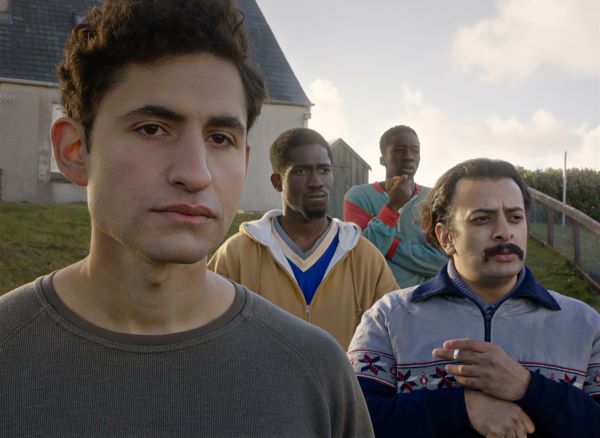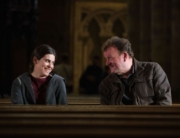
The sky is grey, the wind is howling, the sea roars, the landscape contains little but rocks and grass. There is also essentially no cell phone service. This is a sparsely populated island off the northwest coast of Scotland, where a group of refugees wait for approval of their asylum requests. As part of the process, they are forced to watch and sometimes participate in humiliating classes led by locals Margaret (Grace Chilton) and Stevie (Lewis Gribben) about how to apply for a job or on how not to dance with someone—under the topic, “Sex: Is a Smile an Invitation?” The Scots are so bad at reading the room that they are met with the stone-faced stares from the applicants.
Once a week, the men gather around a lone phone booth to call their loved ones. Chief among them is Omar (Amir El-Masry), an oud player from Syria, whose parents have fled to Istanbul while his brother has chosen to stay in Syria and fight. Omar’s hand is in a cast, which bars him from playing his instrument, yet we sense that he has been so devastated for having been chased out of his country that he cannot work up the energy to play regardless.
He spends most of his time, when not alone, with the much cheerier Farhad (Vikash Bhai), an Afghan refugee who insists he will be Omar’s agent/manager, but mostly he drifts around the Scottish landscape and bears his pain quietly when the locals ask him broad and insensitive questions, like whether he plans on raping anyone. The aptly titled Limbo is the story of men’s struggle to bear this period of waiting.
The strongest element here is director Ben Sharrock’s visual style. Shots are often composed so that the vast terrain contains something singularly incongruous, often in the form of an object of a jarring color, such as a red car or a blue raincoat, which is sometimes comic but overall communicates both the loneliness of the men and the oddness of the location. There is also appealing deadpan humor in the way Sharrock cuts between the absurd figures of Margaret and Stevie and then the unamused faces of the refugees. Bhai is the standout in an ensemble that is difficult to find fault with. He radiates an irrepressible earnestness in an unforced way that makes it difficult not to be drawn to Farhad.
Limbo has its heart in the right place. It presents characters whose dilemma commands our sympathy, and its visuals are sometimes the source of surprising humor. This, however, is not enough, and while I won’t say this film falls flat on its face, it certainly doesn’t soar. While part of the script’s point is that not much happens on this island, the script nevertheless lacks imagination. It is not that nothing happens at all, but for too much of time we are watching the blank-faced stares of the refugees or Omar making his solemn way across the landscape. As a result, the film loses steam about halfway through. Sharrock places too much faith in the embittered stillness of his characters to compel our attention.
The script also, at times, lacks nuance—the Scottish islanders are handled in the broadest possible strokes while the refugees are psychologically realized characters. More detrimentally, it relies on some devices that are difficult to take seriously, such as a hallucination in which Omar’s brother pep-talks him into playing his instrument again.
Still, there are some moving and delightful moments. Farhad, for instance, loves Freddie Mercury, and ends up bringing a chicken, who he names Freddie Jr., into the flat without the permission of his mates. I will leave what ensues to those who want to see the film.
















Leave A Comment